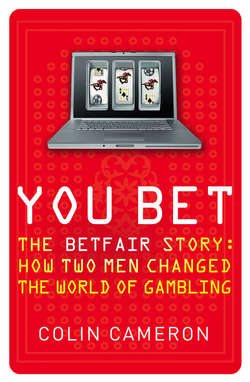Читать книгу You Bet: The Betfair Story and How Two Men Changed the World of Gambling - Colin Cameron - Страница 5
PREFACE
ОглавлениеAN INTERESTING WHEEZE
During breaks from the writing of this book, any general conversation about the subject matter usually fell into two categories. On one hand plenty wanted to know how, as the subtitle of You Bet suggests, two men changed the world of gambling and in the process – and this was the real hook – became multimillionaires. Equally some others wanted to consider the ethics of setting up a company that promotes betting.
Immoral or amazing? An ‘interesting wheeze’ was one description of Betfair. After reference to the dictionary definition of ‘wheeze’ – a cunning plan – this was refined to ‘interesting concept’. As a business endeavour, Betfair is at very least that. To the more enthusiastic the company’s progress represents a breathtaking corporate tale of all-conquering growth culminating in market domination and handsome profit.
To me, the story of Betfair, which forms the first part of this book, is a compelling narrative of individuals giving up often assured and substantial incomes in return for pursuing an idea in the spirit of true entrepreneurship, of which there is currently a substantial need, worldwide. As a winner, twice, of Queen’s Awards for Enterprise, Betfair has the endorsement of the highest levels of government, and the head of state, Herself.
As for the ethics of Betfair, a negative view on the morality of person-to-person betting probably reflects a position on gambling established before the company was even launched. Moreover, if you were against the activity, in whatever form, before 2000, I would suspect your view of Internet betting of any kind is that this simply brings the unwanted vice of gambling into the home. The world of Internet betting in which Betfair sits very central makes ‘it much easier, regrettably, for enormous sums to be spent unthinkingly’, said Andrew Langdon, court recorder in the case of Bryan Benjafield. The 23-year-old book-keeper was sentenced in 2008 to five years in prison having gambled over £1 million of a Dorset construction company’s holdings with online casino websites, in all around one tenth of his employer’s annual turnover.
An old friend from university is not hostile to gambling. A bet just leaves him cold. A few years ago, when he worked in London’s financial sector, he went to Goodwood at the invitation of a City client. On each of the afternoon’s seven races he placed bets of £10 and was left pondering that even in those contests where proceedings culminated in the closest of photo finishes his heart and pulse rates hardly deviated from normal. Yet, like me, he, too, found the Betfair story intriguing, (possibly even more so than the hedge fund he ran, before quitting to embark on a degree in English, twenty years after graduating from Cambridge in the Sciences). If you have reservations of the morality in Betfair’s core endeavour, I hope that what to me is an historic story of contemporary innovation can still raise your pulse for reasons other than anger.
Of course, whatever your opinion, for consenting adults Betfair is legal. The company went to great lengths and expense to establish this. Betfair cannot be denied on those grounds the host of commendations for creating jobs and general wealth since the company’s launch in 2000. After spending many months dealing with Betfair, it is easy for me to see the basis for the civil reception – recorded in Part Two of this book – that the company received in Whitehall and at the Treasury. Betfair, itself, is, by and large, an open, up-front operation. Bar a reluctance to make available the contact details of one original investor, whom in any case I was able to source, independently, I cannot fault the accommodation I was afforded.
And bookmakers, generally? On an individual basis, and discounting that, as publicly quoted companies, there is a limit to what information could be made available to me, I equally could find little to fault the willingness with which they granted me time and co-operated in answering inquiries often implicitly critical. In my experience, if betting is a business you consider immoral, you might find objections harder to sustain when you are sitting across the table from those who make up the corporate entities with whose trade you take issue.
As well as the subject of betting in a broad sense, I write about a whole range of pleasures such as matters of style to wine and cigars. I am lucky to do so. That said, racing and betting represent, to me, a most welcoming village which, though a non-resident, I am always delighted to be received back as a guest. Likewise, neighbouring towns with interests, which touch on matters relating to Betfair and Internet gambling. The support cast of this book was largely receptive to being interviewed and forthcoming. As for those who were initially reticent, they did at least leave themselves open to persuasion. Please note that none, Betfair, bookmakers, or otherwise contributed in any way to the cost of publication.
If you are a dedicated gambler you will most likely already appreciate how the world of betting can grab you. I hope very much that this book, which should have obvious appeal, serves to give you fresh insight into a pastime that you already savour actively. Beyond this, as this is a story that involves society as a whole, if you are not predisposed to take an interest in betting or have fundamental reservations, please excuse me for suggesting you might nevertheless still want to gamble on this book proving most compelling. Why not take a punt?
COLIN CAMERON, MARCH 2009
